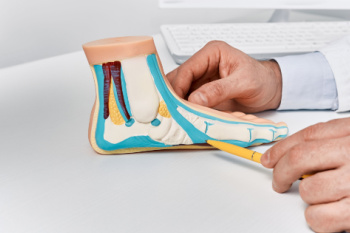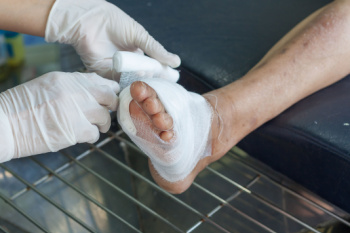Connect With Us
Blog

Flat feet, or fallen arches, are a common foot condition where the arches of the feet collapse, resulting in the entire sole of the foot making contact with the ground. Understanding the various causes, including hereditary conditions such as Ehler-Danlos syndrome and Marfan syndrome, may shed light on this condition's complexity. Genetics can influence the structure and alignment of the foot's bones, tendons, and ligaments. Individuals with a family history of flat feet are more likely to inherit the trait, predisposing them to this condition from birth. Additionally, certain medical conditions such as arthritis, obesity, and diabetes can contribute to the weakening of the foot's supportive structures, leading to flat feet over time. Furthermore, injury or trauma to the foot, prolonged standing or walking on hard surfaces, and wearing unsupportive footwear can exacerbate the condition. If you have flat feet, it is suggested that you are under the care of a podiatrist who can offer you effective relief and treatment methods.
Flatfoot is a condition many people suffer from. If you have flat feet, contact one of our podiatrists from Front Range Podiatry. Our doctors will treat your foot and ankle needs.
What Are Flat Feet?
Flatfoot is a condition in which the arch of the foot is depressed and the sole of the foot is almost completely in contact with the ground. About 20-30% of the population generally has flat feet because their arches never formed during growth.
Conditions & Problems:
Having flat feet makes it difficult to run or walk because of the stress placed on the ankles.
Alignment – The general alignment of your legs can be disrupted, because the ankles move inward which can cause major discomfort.
Knees – If you have complications with your knees, flat feet can be a contributor to arthritis in that area.
Symptoms
- Pain around the heel or arch area
- Trouble standing on the tip toe
- Swelling around the inside of the ankle
- Flat look to one or both feet
- Having your shoes feel uneven when worn
Treatment
If you are experiencing pain and stress on the foot you may weaken the posterior tibial tendon, which runs around the inside of the ankle.
If you have any questions please feel free to contact our office located in Littleton, CO . We offer the newest diagnostic and treatment technologies for all your foot and ankle needs.

Foot protection is a critical aspect of workplace safety that often goes overlooked. Whether you work in construction, manufacturing, healthcare, or any other industry, ensuring the safety of your feet is essential for preventing injuries and maintaining productivity. A variety of hazards, including heavy objects, sharp materials, electrical equipment, and slippery surfaces, pose risks to the feet in the workplace. Choosing appropriate footwear, such as steel-toed boots, non-slip shoes, or puncture-resistant soles, can provide vital protection against these dangers. Additionally, proper fitting footwear with sufficient support and cushioning reduces the risk of discomfort, fatigue, and long-term foot problems. By recognizing the importance of foot protection and taking proactive measures, both employers and workers can create safer, more secure work environments. If you have incurred a foot injury while at work, it is suggested that you confer with a podiatrist who can offer effective treatment plans, in addition to providing you with information about foot protection during your workday.
While working on the feet, it is important to take the proper care of them. For more information about working on your feet, contact one of our podiatrists from Front Range Podiatry. Our doctors will treat your foot and ankle needs.
Working on Your Feet
Standing on your feet for long periods of time can cause stress and pain in your feet. Your whole body may experience change in terms of posture, back pain, bunions, callouses and or plantar warts. There are ways to avoid these conditions with proper foot care, smart choices and correct posture.
Positive Changes
Negative heeled shoe – Choosing this shoe type places the heel slightly lower than the ball of the foot. These are great for overall foot health. Find shoes that fit you correctly.
Go barefoot – Our feet were not designed to be enclosed for all hours of the day. Try to periodically expose your feet to air.
Eliminate Pain
Foot Exercises – Performing simple exercises, incorporating yoga and doing stretches are beneficial. This will allow increased blood flow to the area and muscles of the foot.
Achilles tendon – Stretching the foot out flat on the floor will relax the calf muscles and tendon. These exercises can be performed almost anywhere. Make sure you add these exercises to your daily regimen.
With a little bit of this information and knowing more about foot health, you will notice changes. Foot stretches and proper footwear will help with pain and prevent further issues.
If you have any questions please feel free to contact our office located in Littleton, CO . We offer the newest diagnostic and treatment technologies for all your foot and ankle needs.

Diabetic feet represent a significant concern for individuals living with diabetes, as the condition can lead to various complications affecting foot health. One critical fact about diabetic feet is the increased risk of nerve damage, known as peripheral neuropathy, which can result in reduced sensation and difficulty detecting injuries or ulcers. Additionally, diabetes can impair blood circulation, leading to poor wound healing and an increased susceptibility to infections. Individuals with diabetes are also prone to developing foot ulcers, which, if left untreated, can escalate into serious complications such as gangrene and amputation. Proper foot care and regular inspections are essential for individuals with diabetes to prevent complications. This includes keeping the feet clean and moisturized, wearing comfortable and well-fitting shoes, inspecting the feet daily for cuts or sores, and seeking prompt medical attention for any signs of infection or injury. If you have diabetes, it is strongly suggested that you are under the care of a podiatrist who can help you manage this serious condition.
Diabetic foot care is important in preventing foot ailments such as ulcers. If you are suffering from diabetes or have any other concerns about your feet, contact one of our podiatrists from Front Range Podiatry. Our doctors can provide the care you need to keep you pain-free and on your feet.
Diabetic Foot Care
Diabetes affects millions of people every year. The condition can damage blood vessels in many parts of the body, especially the feet. Because of this, taking care of your feet is essential if you have diabetes, and having a podiatrist help monitor your foot health is highly recommended.
The Importance of Caring for Your Feet
- Routinely inspect your feet for bruises or sores.
- Wear socks that fit your feet comfortably.
- Wear comfortable shoes that provide adequate support.
Patients with diabetes should have their doctor monitor their blood levels, as blood sugar levels play such a huge role in diabetic care. Monitoring these levels on a regular basis is highly advised.
It is always best to inform your healthcare professional of any concerns you may have regarding your feet, especially for diabetic patients. Early treatment and routine foot examinations are keys to maintaining proper health, especially because severe complications can arise if proper treatment is not applied.
If you have any questions please feel free to contact our office located in Littleton, CO . We offer the newest diagnostic and treatment technologies for all your foot and ankle needs.

